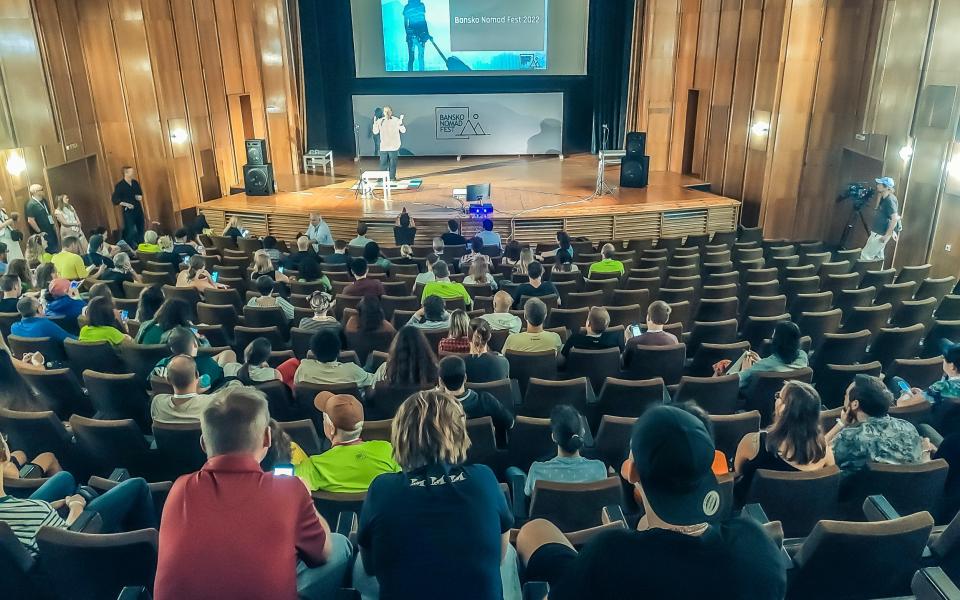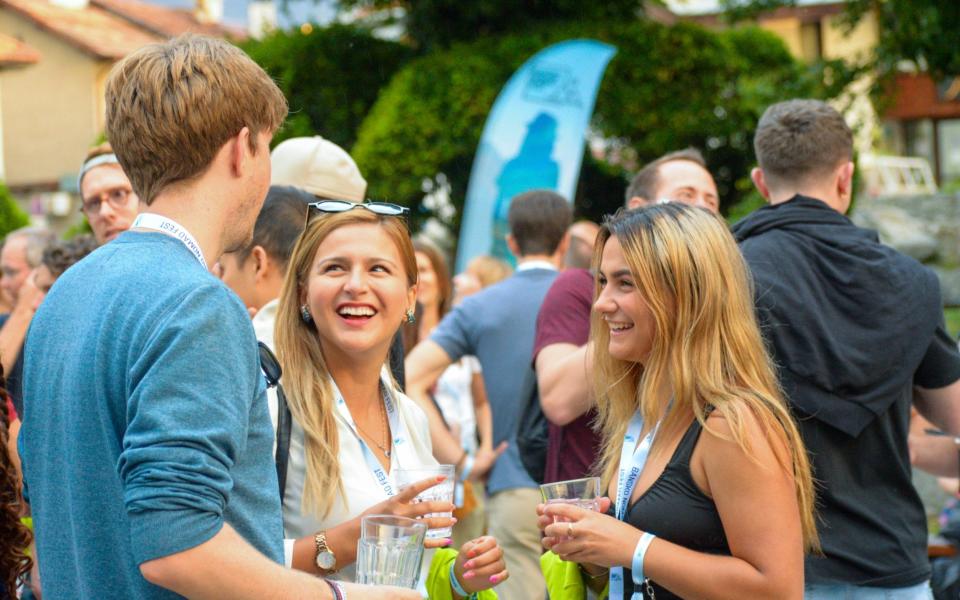Inside the secret world of the digital nomads

Five hundred and fifty people are gathered in a conference theatre in Bansko, a ski resort town 150km southwest of the Bulgarian capital, Sofia. This isn’t an away-day for HR representatives, but Nomad Fest, a work meet-up for digital nomads, the burgeoning breed of freedom-seeking remote worker-hipsters who move around the globe and work from their laptops, preferably beachside or from some up-and-coming, low-priced urban hub. Presumably the word “Fest” is to make the nomads feel at home in what otherwise amounts to a corporate event to hone your skill set.
These digital nomads, from 41 countries, are supposed to have shunned the dullness and strictures of corporate life so they can follow their technology-enabled dreams. But, instead of firing up their Zoom calls from a Bali beach, or a Barcelona rooftop bar where they pay for beer with Bitcoin, they’re here to, err, attend talks on how to be better at their jobs. So far, so not very nomadic. So far, so very HR.
There are 35 million of these digital nomads worldwide, a figure projected to reach more than 1 billion by 2035. Two years of closed borders due to Covid and an increase in remote working has significantly increased itchiness of foot among under-45s, making a Nepalese mountain as viable a workspace as the office desks they’ve turned their backs on. Accelerated by the pandemic, many fledgling remote workers have flocked to Lisbon – declared the best place globally to be a digital nomad, according to recent research from the Instant Group (which cited the city’s 7,000 wi-fi spots as part of the appeal).
Nomad Fest's organiser, Matthias Zeitler, moved to Bansko from Salzburg seven years ago. When he first suggested rural Bulgaria to remote-working friends, “everyone was like, ‘you must be totally crazy’,” admits the 45-year-old, who runs four co-working spaces (stocked with free coffee and oat milk, naturally) across the town. He is determined to make Bansko “the nomad capital of the world”, luring in remote workers with the promise of low rent (£175 per month, or £26,000 to buy a property), a 10 per cent tax rate, and the chance to ski on your lunch break. It seems to be working: the event has grown fivefold since it started in 2020, and is sold out.

Nomads fresh off the plane from Danang in Vietnam, Cape Town and, erm, Croydon tell me that Tbilisi, the Georgian capital, is the new “in” spot. Antalya in Turkey is another fast-growing favourite, as is Tirana in Albania; Mexico City remains a nomad lynchpin, with remote-working Russians streaming to Latin America since the invasion of Ukraine.
The tagline of this year’s conference is “Adventure. Connection. Inspiration”’, printed on the lime-green T-shirts given out to identify fellow nomads (as if it weren’t obvious). Talks include “bridging polarities through empathy for powerful collaboration and wellbeing”, “using tantra to supercharge yourself in business and life” and “how you can transform your business with Filipino virtual assistants”. Most speakers have a podcast or a YouTube channel, book or nomad retreat to sell: it’s a self-perpetuating economy, this, where cash is shunted from one remote-inspired business to another. There are nomad cruises, nomad-specific travel insurance, “passion journals” and co-work space memberships that will unlock office doors from Madrid to Malaysia.
Countries have woken up to this easy goldmine, doling out visas and exempting remote workers from taxes to up their appeal. More than two dozen countries have introduced such schemes since 2019, with destinations from Barbados to Croatia, Panama and the UAE easing once-stringent worker requirements. This week, Thailand reopened to tourists, with ministers assuring laptop-toting visitors who decide to extend their stay that they need not pay tax there.
Not all office-deniers are equal, I learn in Bansko. Factionalism is afoot between remote workers, “true” digital nomads and “location independents”. “A digital nomad is someone who is just constantly on the road,” explains Marc Förster Algás, the 23-year-old founder of a “co-living brand”. “All nomads are location independent, but not all location independents are nomads.” Remote workers, meanwhile, are deemed (often derogatorily) to be those employed by a traditional company, who aren’t expected to go to an office. Turns out it’s all more complex than the “home is where my laptop is” sticker a girl with a(nother) podcast hands me one night from a Ziploc bag.

Whichever category they fall in, the combined effect is pushing nomadism mainstream. That much is clear at this week's mass event, which sees talks from 9.30am-1pm daily across two stages, and afternoons filled with “unconference” sessions – beloved in the startup scene – where meeting agendas are pitched and decided on the spot. There are several talks on buying homes in the town – proof, perhaps, that this vanguard-busting cohort is more traditional than they might like to think.
Still, a healthy dollop of woo-woo runs through the week. Unconference sessions offered include “crowdfunding your future passions into NFTs”, “how to balance your masculine and female energy as a female entrepreneur” and “lifestyle design in a holistic way”. (The tantra couple, who spend their pre-pitch time canoodling in the queue, are not selected.) At night, we “speed network” in the town square with cups of lukewarm boxed wine; there are bonfires and dinners and hikes and afterparties at local bars, where crypto-tips are traded into the early hours. The sound of nomads imploring their peers to follow them “on all the socials” becomes a common refrain.
“The pandemic has definitely made people want to connect not only with other people more, but also with themselves,” says ex-NHS psychotherapist Alice Nettleingham. She quit her job after meeting a stranger on a train in 2015, headed to South Korea and now travels the world as a hypnotherapist with her Italian boyfriend Jacopo – who she met at last year’s Bansko Nomad Fest. Connections are important when living transiently. One virtual CFO currently working in Mexico tells me that, when nomads reconnect in another city, the conversations run far deeper than the average pow-wow between people who have met twice.
Nomad motivations vary widely, depending on who you ask. Some want to travel the world and reinvest in the communities they fleetingly live in. One affiliate marketer from Suffolk is living in Goa because “I just want home comforts” – while bemoaning the price of imported cheddar. Many admit to their families being bemused and even concerned by the Peter Pan-ishness of their chosen lifestyle.
Has the pandemic fundamentally changed attitudes about work, and where we do it from – or is nomadism simply another over-inflated bubble set to burst? Zeitler says his hopes for next year’s event are not necessarily more tickets booked or pictures shared, but “how many people come back to Bansko afterwards and want to engage longer with our community. This is my metric.” Perhaps people will continue flocking to the town, festival or not. But, after a week of hashtags and livestreams and more money being circulated around the nomad economy, something tells me next year's nomad meet-up will be an even bigger behemoth.

 Yahoo Movies
Yahoo Movies 
